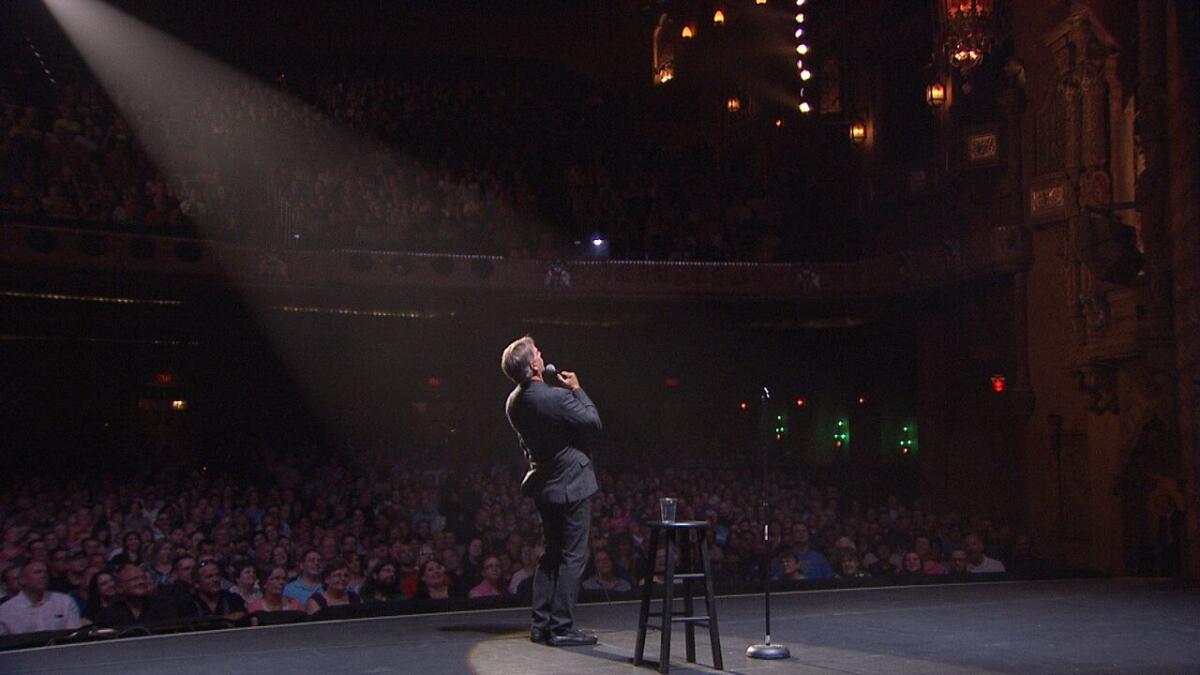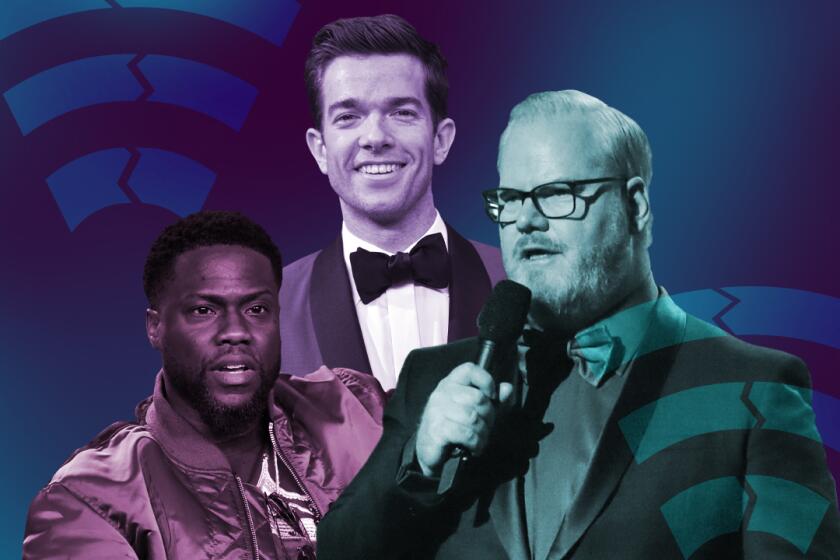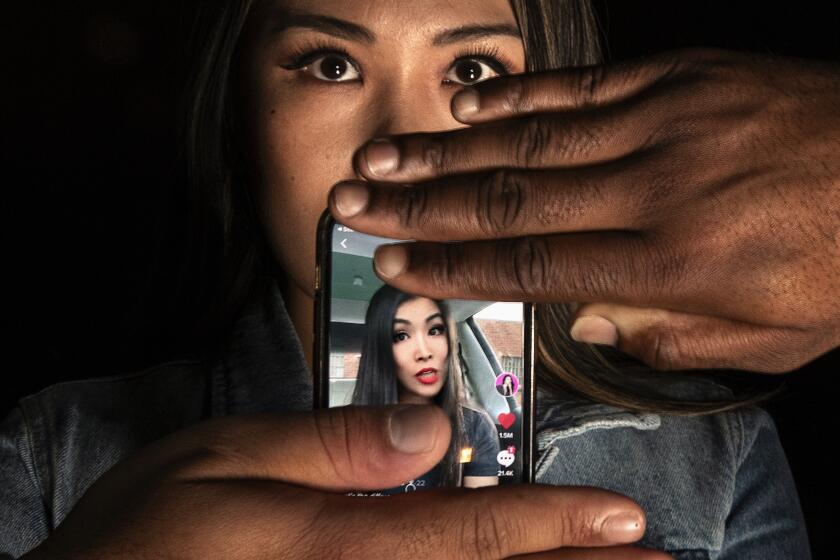Joe Rogan $100 million. Richard Pryor $0. What comedians’ suits against streamers say about a deeply flawed model

- Share via
Last month, comedian Bill Engvall got a very nice email from Sirius XM-owned streamer Pandora, congratulating him on reaching over 600 million streams of his work on its platform from 227,000 monthly listeners. It sounded like a noteworthy milestone for a major headlining comedian, especially one who has been in the game for over three decades. But the well-intentioned gesture alerted Engvall and his team to one major issue: He hadn’t been paid for any of those streams.
“It’s like sending someone a birthday card that says, ‘Whoops I forgot to give you a gift,’” Engvall told The Times.
Last week, Engvall was one of several comedians — including the estates of Robin Williams and George Carlin along with Ron White and Andrew Dice Clay — to sue Pandora in U.S. District Court for the Central District of California over its failure to pay the proper amount of royalties for their copyrighted jokes.
All five suits are making noise about the long-standing practice of streamers seeking only part of the copyright authorizations that comedians who write, rehearse and record their works claim they are owed. As of now, Pandora, Spotify and many others are paying only for the live performance of comedians’ material, not the creative material itself.
“If you invent a product, and it sells, you want to be paid for that,” Engvall said. “And I think sometimes in this society, we tend to ask for forgiveness instead of permission.”
In the case of music, streamers are required to pay for the sound recording copyright as well as a copyright for the underlying written music. Typically the royalties get paid to either public rights organizations such as ASCAP or BMI, which then pay the artists. Currently there is no blanket license set up for ASCAP or BMI protecting spoken-word works on a large scale, and no infrastructure or government regulation that sets out the licensing and royalty payment system.
So streamers like Pandora would have to go to each comic individually in order to secure the proper copyrights to their comedy albums and recorded bits — something Pandora in this case willfully neglected to do, according to the complaints filed by attorney Richard Busch, a partner at King & Ballow representing the several living comedians who sued Pandora.
“For years … Pandora has illegally made reproductions and digital broadcasts on its servers and provided streaming access to its users without a proper public performance license and, when applicable, a reproduction right license,” the suits claim.
Busch’s presence on the case is notable. Over a decade ago, he handled a landmark case against Universal Music Group on behalf of the company that produced Eminem’s early work. The case hinged on whether digital downloads should be treated as “licenses” or “sales” — a substantial accounting difference that altered the economics of music distributing numbers in the iTunes era. Busch has taken on Spotify in a number of high-profile cases alleging infringement.
“This is a very important case, not just for my clients but for many other comedians who are out there, whose work is streaming on these platforms,” Busch said. “We look forward to litigating the cases.”
Pandora, based in Oakland, declined to comment on the current litigation.
When it comes to collecting copyright infringement damages, an artist who gets a favorable judgment may collect actual revenue, plus what’s called profits attributable to the infringement. Actual damages would be what an artist would have licensed their work for had they engaged in an arm’s-length negotiation before the infringement began; the damages would include the artist’s loss for royalties. As a penalty, a plaintiff also can get the profits attributable to the infringement.
If a comedian or their estate could prove that Sirius XM’s market cap and its advertising budget were based on some fraction of having these works, the comedian could possibly get profit from the infringement.
Alternatively, when damages are harder to calculate, there’s another option: statutory damages. This allows the jury to award damages ranging from a very small amount up to $150,000 per copyrighted work in cases of willful infringement, which could be a single recorded joke or a track on a comedy album. For example, if a comedian has 70 copyrights, multiplied by $150,000 each, that fee ends up being north of $10 million.
Together, the five current lawsuits against Pandora seek $41.55 million in damages from the streamer.
Jeff Price, chief executive and co-founder of Word Collections, is working with comedians involved in the suit to fight for what they believe they’re owed.
The founder of music distribution site TuneCore and Audiam started his global copyright administration company in 2020 to ensure comedians’ and songwriters’ works are properly licensed and paid for by the global digital services. The investors in the company include the band Metallica, a long-term client of Price.
Price said Pandora and other streaming companies have simply chosen not to seek a license for the underlying works, meaning comedians like Robin Williams and his estate have not been paid anything for the streaming of their work on these platforms.
Price said that from 2011 to 2017, Pandora disclosed in regulatory filings that it did not have licenses for these works and that it was a potential liability.
In a complaint filed last week, Williams’ estate alleged that Pandora rejected the attempts by Word Collections to negotiate a licensing agreement. According to the suit, Pandora improperly offered 16 of Williams’ works through its streaming service without paying even a “fraction of a penny.”
Using Williams as an example, Price said, “Let’s say he’s singing the words ‘reality, what a concept’ — in that case ... the licensing schema would have been in place, a royalty would have been generated and [Pandora] would be paying the license. But because he said the words ‘reality, what a concept’ (…) they didn’t deal with it,”
So far, some platforms have removed content when comedians’ representatives complained about payment over royalties. In December, Spotify removed various performances from comics represented by rights organizations, including works by John Mulaney, Jim Gaffigan, Tiffany Haddish, Jeff Foxworthy and Kevin Hart.
Price said the same issue exists for other platforms and he has contacted Sirius SM, iHeartRadio, Tidal, Spotify, Amazon and YouTube Music on behalf of his clients, which also include Richard Pryor’s estate.
“I have a responsibility to my clients to reach out to every entity on the planet that is using their works and get them licensed and get my clients paid,” Price said. “There is a global problem. All these people’s works are being used without a license. These guys aren’t getting paid and there’s no excuse for it. The problem needs to be fixed. It’s not a matter of if, it’s a matter of when.”
The massive deal signed between Spotify and Joe Rogan in 2020 further highlights the issue of stark inequality facing comedians, even for legends of comedy like Richard Pryor, whose estate is not properly compensated for his streaming royalties, Price said.
“Joe Rogan was paid a lot of money. Why? Because they wanted to use Joe Rogan’s works to attract users and they paid the man $100 million for that,” Price said. “How many people are Richard Pryor fans that go to an entity like Spotify to listen to his works? I’ll bet it’s more people than [the audience that listens to] Joe Rogan. And they didn’t even bother to pay Richard Pryor or his estate anything, but they’ll pay Joe Rogan north of $100 million?”
For Engvall and the other comics involved in the suits against streamers, the landscape of comedy changed a lot with regard to keeping track of who was using or profiting from your material. “When I was doing the comedy club circuit, we kind of policed each other if a comedian was caught using one of your jokes,” Engvall said. “But when the streaming services hit, there was just no way to keep up with it because you never got any record of what was played.”
Though it’s a long time coming for big-name comedians to make noise about the money they’re owed for their material, Engvall says the outcome of the recently filed suits could mean a lot to up-and-coming comedians down the road.
“While I’ve been fortunate enough in my career to generate a name, there’s a lot of cats out there that don’t but their stuff is being used and they need to be paid as well,” Engvall said. “None of us are asking for any more than what we’re owed.”
More to Read
Inside the business of entertainment
The Wide Shot brings you news, analysis and insights on everything from streaming wars to production — and what it all means for the future.
You may occasionally receive promotional content from the Los Angeles Times.















